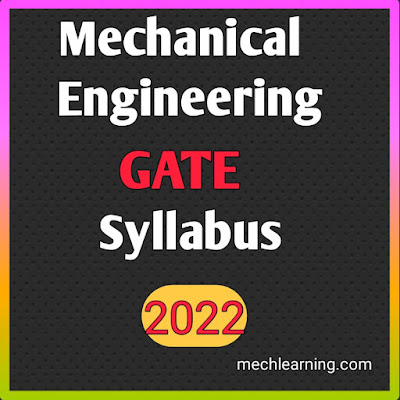The Mechanical engineering, is play's very important branch in today's Technology that Assist you to do work with ease, so let's learn about Mechanical engineering gate syllabus that would helps to understand the GATE Aspirants.
Graduate Aptitude Test in Engineering (GATE):-
 |
| Mechanical engineering gate syllabus |
GATE Mechanical Engineering (ME) Exam syllabus 2022:-
The exam syllabus for mechanical engineering GATE 2022 is as follows:-
The overall GATE Mechanical Engineering (ME) Paper consists of 65 questions with a total of 100 marks with given 3 hours timing.
The syllabus divided into five (V) sections, each section consisting of different weightage of marks.
The detailed section wise syllabus for GATE 2022 mechanical engineering is as follows:-
 |
| Mechanical engineering gate syllabus |
Section I (13% of the total marks)
Engineering Mathematics:-
1. Linear Algebra:-
Matrix algebra, systems of the linear equations, eigen values and eigen vectors etc.
2. Calculus:-
Functions of variable (single), limits, continuity and differentiability, mean values theorems, indeterminate forms; evaluation of definite and improper integrals; integrals (double and triple),
partial derivatives equations, total derivative, Taylor series, maxima and minima,
Fourier series; gradient, divergence and curl, vector identities, directional derivatives, line integral, surface and volume integrals, Gauss, Stokes and Green’s theorems etc.
3. Differential equations:-
First order equations, higher order linear differential equations, Euler-Cauchy equation,
Laplace transforms; solutions of the heat equations, wave equations and Laplace equations etc.
4. Complex variables:-
Cauchy-Riemann equations, Cauchy’s integral theorem and integral formula, Taylors series.
5. Probability and Statistics:-
Definitions of the probability, conditional probability; mean, median, mode and standard deviation,
random variables, binomial distributions, Poisson distributions and normal distributions.
6. Numerical Methods:-
solutions of linear and non-linear equations, integration by trapezoidal and Simpson’s rules, single and multi-step methods for differential equations.
Section II (24% of the total marks)
Applied Mechanics and Design section:-
1. Engineering Mechanics:-
Free-body diagrams and equilibrium, friction of belt-pulley, brakes, clutches, etc,Trusses and frames,virtual work,
kinematics and dynamics of rigid bodies in plane motion, impulse and momentum and energy equations.
2. Strength of materials:-
Stress and strain, elastic constants, Poisson's ratio, Mohr’s circle for plane stress and plane strain,
thin cylinders; shear force and bending moment diagrams, strain gauges and rosettes,
bending and shear stresses, deflection of beams; torsion of circular shafts; Euler’s theory of columns; energy methods; thermal stresses;
3. Theory of Machines:-
Displacement, velocity and acceleration analysis of plane mechanisms, linkages, cams and followers, balancing of reciprocating and rotating masses; gyroscope, gears and gear trains; flywheels and governors.
Vibrations:-
Free and forced vibration of single degree of freedom systems, effect of damping; vibration isolation, resonance, critical speeds of the shafts.
4. Machine Design:-
Design for static and dynamic loadings, failure of theories, fatigue strength and the S-N curves, rolling and sliding contact bearings, brakes and clutches, springs, bolted, riveted joints and welded joints; shafts, gears.
Section III (24% of the total marks)
Thermal engineering section:-
1. Fluid Mechanics:-
Properties of fluids, fluid statics, forces on submerged bodies, stability of floating bodies, Bernoulli’s equation; dimensional analysis, elementary turbulent flow, flow through pipes, head losses in pipes, bends and fittings; basics of compressible fluid flow, boundary layer Theory.
2. Heat-Transfer:-
Modes of heat transfer, one dimensional heat conduction, fins, unsteady heat conduction, heat exchanger performance, LMTD and NTU methods, radiative heat transfer, Stefan- Boltzmann law, Wien displacement law, black and grey surfaces, view factors, radiation network analysis.
3. Thermodynamics system:-
Thermodynamic systems and processes; properties of pure substances, behavior of ideal and real gases; zeroth and first laws of thermodynamics, work and heat, second law of thermodynamics; thermodynamic property charts and tables, availability and irreversibility; thermodynamic relations.
4. Applications:-
Power Engineering:-
Air and gas compressors; vapour cycle and gas turbine cycles, concepts of regeneration and reheat,
I.C. Engines:-
Air-standard cycle, Otto cycle, Diesel cycle and dual cycles.
Refrigeration and air conditioning:-
Vapour and gas refrigeration and heat pump cycles; properties of moist air, psychrometric chart, psychrometric processes.
Turbomachinery:-
Impulse and reaction principles, velocity diagrams, Pelton wheel, Francis Turbines and Kaplan turbines, steam turbine and gas turbines.
Section IV (24% of the total marks)
Manufacturing, and Industrial Engineering Section:-
1. Engineering Material science:-
Structure and properties of engineering materials, phase diagrams, heat treatment process, stress-strain diagrams for various engineering materials.
2. Manufacturing process:-
Casting, weldings, hot and cold working processes; forging, rolling, extrusion, drawing and sheet metal operations, forming processes, powder metallurgy.
Mechanics of machining; single and multi-point cutting tools, tool geometry and materials, tool life and wear; economics of machining; principles of nontraditional machining processes, jigs and fixtures, NC/CNC machines and CNC programming.
3. Computer Integrated Manufacturing
Basic concepts of CAD/CAM systems and their integration tools; additive manufacturing.
4. Operations Research:-
simplex method, PERT and CPM, assignment network model, Linear programming, network flow models, queuing models.
Forecasting models, aggregate production planning, scheduling, materials requirement planning; lean manufacturing, safety stock inventory control systems.
Section V (15% of the total marks)
General Aptitude (Common to all Branches)
1. Verbal Ability:-
English grammar; Sentence completion, Critical reasoning, Verbal reasoning.
2. Numerical Ability:-
Numerical computation; Numerical reasoning, Numerical estimation; Data interpretation (DI).
GATE Mechanical Engineering (ME) Exam Patterns 2022:-
The detailed exam pattern for GATE 2022 is as follows:-
- Mode of Exam Online examination
- Duration of exam 3 hours
- Types of questions MCQs (multiple choice questions) and NAT (Non Answered Type)
- Sections main 3 sections – General Aptitude Section, Mathematics section and Subject-based section
- Total number of questions 65 questions
- Total marks 100 marks
- Negative Marking for exam For MCQs only.
Here we concluding, If you have any queries about the Mechanical engineering gate syllabus then feel free to comment below.
Here we concluding, If you have any queries about the Mechanical engineering gate syllabus then feel free to comment below.






The institution stands out when evaluating **Civil Engineering Colleges in Nagpur**.
ReplyDeleteDiscover the Best Engineering College in Nagpur for your future in technology and innovation.
ReplyDelete